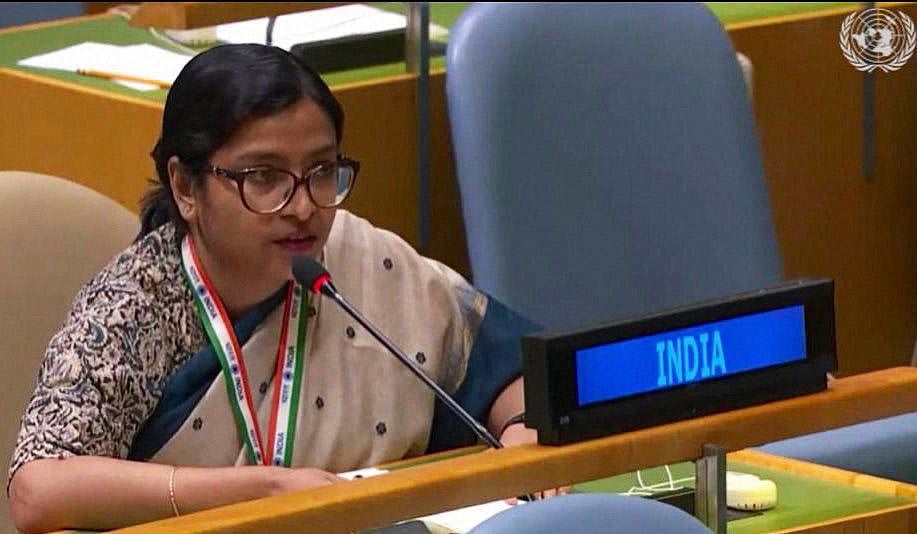Kashmir: Battle for pride and perception
Indian diplomats had a challenge in neutralising backlash after scrapping of Article 370

The rebuttal by Vidisha Maitra of Pakistan Prime Minister Imran Khan’s address on Kashmir in the United Nations General Assembly has taken India by storm. Her six-minute long speech, was feisty, factual, and delivered in a calm and measured tone. And this was in complete contrast to Imran’s invective. In Pakistan, the reactions were different; Imran’s speech was hailed, and the Dawn said ‘PM Imran minces no words’. Interestingly, at the UNGA against Imran’s 30-minute outburst, Indian Prime Minister Narendra Modi’s speech was short, and made no mention of Kashmir.
Here, the attempt will be to study how India crafted its policy to shape world opinion as it came under intense scrutiny for scrubbing the autonomy accorded to the state of Jammu and Kashmir. The constitutional aspect of this decision is not the focus nor the complicated backdrop to the Instrument of Accession. We are concerned with the perceptional battles that India is fighting: how is it engaging with those who are critical of its recent actions and is it winning this battle? What are the instrumentalities of this combat and how is its principal agent, the Indian Foreign Service (IFS), carrying out this mission? Some say the IFS has never had to face such a formidable challenge in its history and so this may indeed be its ‘finest hour’ (to borrow Churchill’s famous phrase).
First, India’s strategy seems layered, and replete with symbolism and words that convey multiple meanings. It had to because it faced a huge backlash from the Western press, especially the New York Times and Washington Post, as soon as it withdrew the special status and imposed severe restrictions in Jammu and Kashmir. Telephone lines were cut, the internet was off, regular movement was drastically curtailed and the Western press categorised these as human rights abuses. Pakistan was favoured while India, which enjoyed a better press earlier, became a punching bag.
Riveting performance
Second, it had a foreign minister, who was previously the foreign secretary, a veteran in the art of diplomacy, well-versed in international politics and enjoyed his prime minister’s complete confidence. The Ministry of External Affairs and its foreign minister were in complete unison and this made for consistent and strong articulation of India’s foreign policy. Public diplomacy and deft use of soft power were on full display; sometimes bordering on steroids. ‘Howdy Modi!’ and the photo-ops with Trump was messaging at its best: a counter-attack akin to the use of an armoured column to punch a hole through enemy’s fortifications. Imran’s allusions to fascism, bloodbath, less than a subtle messaging of nuclear blackmail, and charges of genocide were demolished when the leaders of the world’s oldest and largest democracies walked hand in hand to enthral crowds. Imagery is everything in politics and international relations and these visuals manufactured for TV screens totally refuted India’s detractors.
Also Read
Kashmir story needs to be told in fullWill India’s right wing intellectual stand up please?India not ready for a Uniform Civil CodeThird, Vidisha Maitra’s performance was riveting. She juxtaposed words like brinkmanship and statesmanship, cited statistics on how Pakistan’s Hindu population has shrunk from some 18 per cent to less than 2 per cent, and then followed up with a frontal attack on Imran’s use of words that she said reflected a medieval mindset. It was indeed a decimation of the opposition, simply by a war of words; after all, words are vessels of reasoning politics, nay more like weapons in perceptional battles. Showcasing Maitra’s speaking skills was masterful; she was forceful, pointed and clever. Her use of that forgotten family name ‘Niazi’ when referring to Imran was ingenious and cheeky. Lt General Niazi, the last governor of East Pakistan (now Bangladesh) surrendered to the Indian Army and was taken POW and Imran belongs to the same tribe as the General.
India’s trump card
Fourth, India subtly reset the entire debate on Kashmir as a purely domestic matter and therefore something any sovereign country could take offence to. India’s primary contention is that the international community has no locus standi, therefore the country is justifiably aggrieved to be grilled on its actions. How would the US feel if the annexation of state of Texas was questioned? (Texas declared independence from Mexico in 1836 and joined the Union only in 1845). The Texas story is salutary.
Lastly, India’s trump card of Mahatma Gandhi and his philosophy of truth, peace and tolerance was rolled out as well as the country’s ancient traditions of religious diversity and pluralism. Unquestionably, India is winning this battle and the entire toolkit, of soft power to calibrated use of coercive measures of the state, is being deployed. That said, there are serious challenges ahead. Yes, Brussels, Geneva and New York have bought into India but it still has to decisively win the war of minds in Kashmir. India needs to think and act creatively and magnanimously.
There is no turning back now. The die is cast.
— Ravi Menon is a Dubai-based writer, working on a series of essays on India and on a public service initiative called India Talks.
Sign up for the Daily Briefing
Get the latest news and updates straight to your inbox
Network Links
GN StoreDownload our app
© Al Nisr Publishing LLC 2026. All rights reserved.